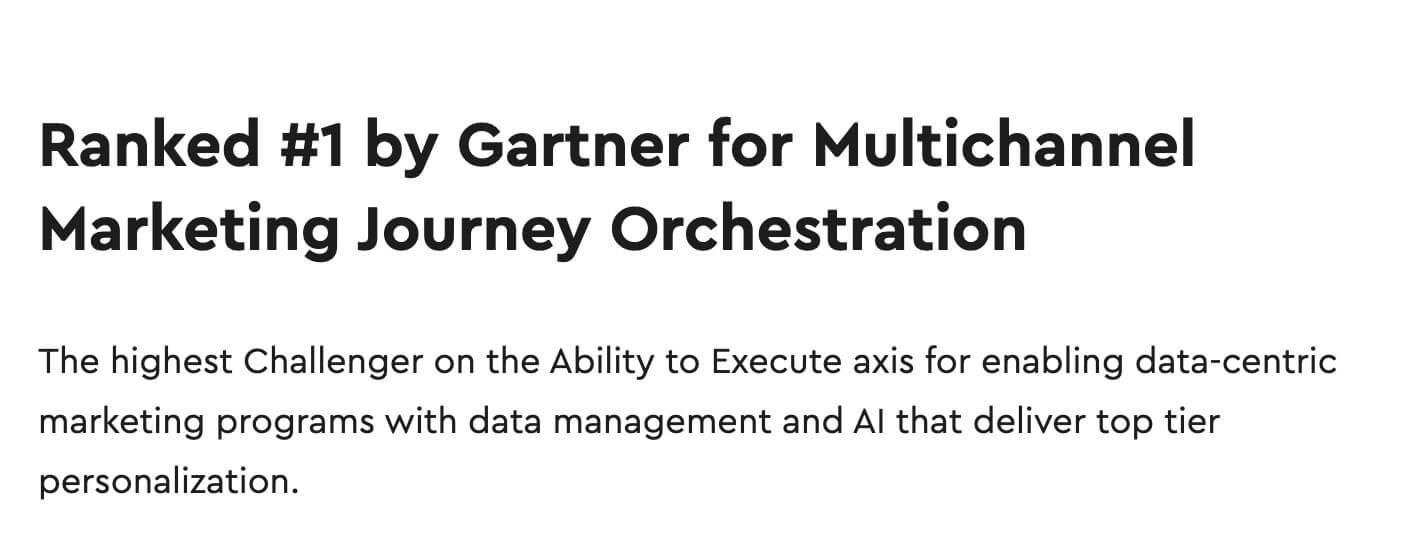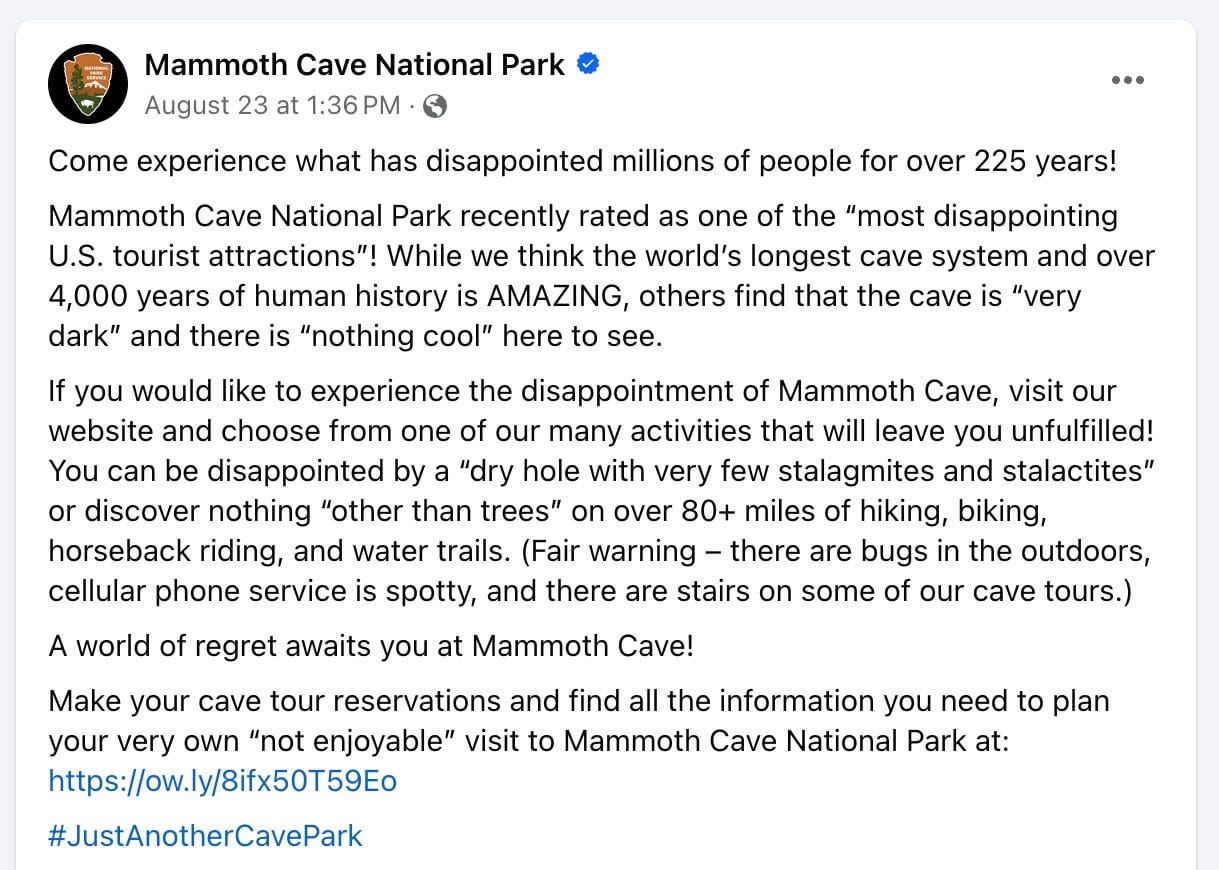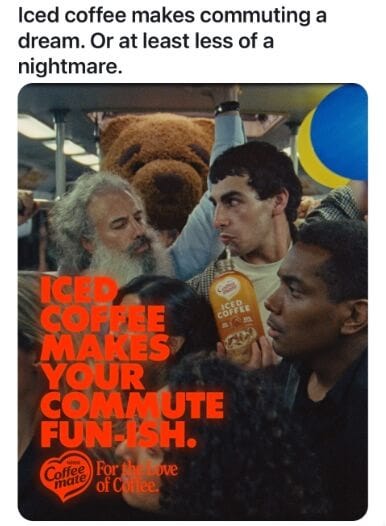If your CEO makes up some words and tells you to use them in your marketing...
Please say no. Also...our city is terrible, please don't visit.
Hello Gobbledeers,
How’s it going? Good? Good.
Today we’ve got:
Making up new words is probably not the best use of your time, marketing-wise.
Telling people your product is terrible can be a good idea (tourism edition).
Also:
As I mentioned last week:
I’ve been working with clients on a quick way for them to improve their website messaging, because I’ve learned that not everyone is ready for a 2-day workshop. This initial group has made huge improvements in the clarity of their messaging, and they can make those changes within the week.
Here’s how it works: You pick 3 pages on your website. I’ll go through those pages word-by-word and provide feedback and copy ideas to make your message clear. Easy, and also peasy. Because I want as many companies as possible to have clearer messaging, the cost for this is just $1,000. As a client just wrote to me, “We are so glad we got your help!” You’ll be glad too.
Just fill out this quick form and we’ll get your messaging fixed in no time. (Or if you’re too lazy to fill out a form, just send me an email at jared@sagelett.com).
(End of commercial.)
My position on positions and being position-less
Anyone who has worked in startup world knows that regardless of what you’ve read other places, there’s really just one rule in startup world:
Sometimes the founder will come to you with some crazy-ass nonsense, and you just have to nod and write up whatever he’s (of course, he’s) saying.
Like, for example, let’s say you work for the marketing orchestration something something called Optimove.
(Congrats, you have a job, which is more than lots of marketers can say right now.)
Optimove is in a crowded space and they’re trying to differentiate themselves. Smart! But, 100 gobbledybucks to anyone who can explain this gobbledy on their website:
They were ranked #1. That’s good…
…Well, the highest “challenger.” I don’t know what that means…
…On the “ability to execute axis” (axis?)…
…For enabling data-centric marketing programs with data management and AI that deliver top tier personalization.
Whew!
Here’s a quick piece of free advice:
Less is more. If you’re #1, then you’re number 1. If you’re number 1 but it takes 12 clauses to explain the manner in which you have been ranked number 1, then you are not number 1.
Anyway, they’re in a crowded space and they’re trying to explain how they’re better than everyone else.
And so the CEO/Founder person, I have no doubt, walks over to (or sets up a Zoom call with) the head of marketing and explains that he has an idea for how they can position themselves in the market.
And I would imagine the head of marketing taking a moment to decide if they should just quit right there or whether they should at least listen to the idea.
They listen to the idea.
And I’ll spare you the back and forth, but here’s what you need to know:
The idea the CEO comes up with is that today’s marketer is a “Position-less Marketer.” Or, based on this page, they are sometimes a “Position-less marketer” where ‘marketer’ is not capitalized. Or sometimes “position-less marketer” where none of it is capitalized.
Anyway, here’s how they introduce it:
The term “Position-less Marketer” was coined by Optimove CEO Pini Yakuel in his address at Connect 2024, Optimove’s user conference held in London.
“We’re more than one profession, aren’t we?” he asked. “As humans, we have a wide gamut of traits, capabilities, and skills. Sometimes, we’re pigeonholed into doing just one thing. It’s time for marketers to unlock their multipotentiality benefiting their growth and the business’s.”
Ah yes, so the CEO came up with this thing, and then dumped it on the marketing team to figure out how to explain it to people. Also, they made up “multipotentiality.”
They have a full FAQ on the page, which you should definitely read, if only to ensure that you never, ever write anything like it, but which is meant to answer all of your “burning questions” about this thing. This was my favorite:
What is multipotentiality, and how does it relate to being a position-less marketer?
Multipotentiality refers to having multiple exceptional talents, which can relate to being a position-less marketer as it emphasizes the ability to excel across diverse roles and functions within the marketing domain.
I assume that the CEO has long-believed that marketers just do one thing and now he has discovered that - wait for it - they actually do SEVERAL things???? WTF?
Here’s the thing:
I get that it’s fun to make up new terms for stuff. I mean, I made up “gobbledy” so, y’know, guilty. But I’ve now been writing about gobbledy every week for 2 1/2 years, and I can probably count on 2 hands the number of people who use it to refer to all this, er, gobbledy.
CEOs - please stop wasting your time on this. More importantly, please stop wasting your multipotential position-less marketers’ time on this. They’re going to have to train the sales team to blabber about this in their sales meetings. And the marketing team will have to talk to the PR agency and try to get them to place articles about it in the industry press. And nobody will know what the hell you’re talking about. And it won’t help you sell more software. No matter how many potentials your marketers have, it won’t be enough to make this work.
But - if you’re a CEO and you feel the desire (or burning desire) to create a new term, there’s only 1 rule for creating a new term: you cannot invent a second new term to define the first new term. You want to yammer about the “position-less” marketer, go for it. You want to yammer about the “position-less” marketer and how you’ll know you’re a “position-less” marketer because you’re chock-a-block with multipotentiality? Please don’t.
(Thanks to Gobbledy reader LT for the heads up. She is definitely a multipotential position-less Marketer.)
Please don’t come visit here
Longtime readers may have noticed that my favorite marketing tactic is to take something awful about your product and turn it into a positive. We’ve talked about Buckley’s cough syrup, which was marketed with the tagline, “It tastes awful. And it works.” And we’ve discussed Listerine’s campaign that used the tagline, “I hate it but I love it” that focused on the foul flavor, but great results offered by the product.
With those in mind, I wanted to share 2 great examples using that strategy from the travel industry:
If you’ve ever gone on Tripadvisor and looked up reviews of famous landmarks, one of the things you’ll notice is that some people have complaints about very, very, very well respected places. The Statue of Liberty, for example, merits only 4.5 stars. I assume it lost half a star because you can’t walk there.
The fine social media team at Kentucky’s Mammoth Cave National Park also noticed that some people had complaints about their visits, and instead of pretending that everyone loves it, they embraced the hate and wrote this incredible Facebook post that includes the phrase, “A world of regret awaits you at Mammoth Cave!”
Bravo, Mammoth Cave National Park. I look forward to visiting your not enjoyable caves soon.
Speaking of where I will visit just because of their tourism taglines, you may remember when we talked about Nebraska retiring their tourism slogan, “Nebraska, honestly it’s not for everyone.”
That is brilliant and it makes me actually not want to visit Nebraska now that they’ve retired it.
Since Nebraska won’t embrace this strategy, I have to give credit to the Oslo tourism folks who came up with this very Norwegian ad called, “Is it even a city?”
For those of you who are too lazy to watch that, here’s the transcript (you’re welcome):
[Voiceover of a guy with a Norwegian accent, while the video shows images of Oslo.]
I wouldn't come here to be honest. Oslo is just not… I mean is it even a city? Everything is just so available, you know. There's no exclusiveness. I grew up here and I temporarily live here, unfortunately. I don't understand why people go swimming in the middle of the city it's disgusting.
You ever been to Istanbul?
Oslo feels more like a village maybe. I mean, you you walk around a corner and it's like, “Oh, there's the Prime Minister.” And you walk around the next corner it's like, “Oh there's the king.” I mean ,you could just walk from one side of town to the other in like 30 minutes. Try that in New York or Paris.
Culture… uh I don't know… if you don't have to stand in line for at least a couple of hours is it even worth seeing?
…Sometimes I just walk right in off the streets and get a table. And I'm not even famous. I mean, what does that tell you ? I think a city should feel a little hard to get. It's like a good relationship, you know. It's not supposed to be easy.
One thing we talk about a lot is how you make a prospect know that the product is right for them. One option is to be really specific - I worked with a client this week on this very thing, and we changed some copy on the website to include the phrase, “for small sales teams.” Because the product is built for small sales teams. You should let buyers know that it’s for small sales teams. (That’s the kind of amazing advice you’ll get if you hire me to review your site copy).
A much higher degree of difficulty is to present your competitors’ characteristics as benefits, and hope that your buyer recognizes that those wouldn’t be benefits at all.
“I think a city should feel a little hard to get…like a good relationship.”
Except that’s the opposite of Oslo’s pitch. They actually trust that the reader will understand that a city that feels like a village, where you might bump into the king, and where you can just walk in and get a table in a hot restaurant is much better than Paris or New York where getting the most out of the city is challenging.
Bravo, Oslo.
Last but not least…
Yeah, they’re selling iced coffee, but the ad is about travel (even if the travel is on the subway). Along the lines of taking a negative and making it a positive, underselling the benefits can be an effective way to show that your product will make your life just a little bit better:
As always - thanks for reading to the end. As mentioned above, it’d be great if we can work together (because then your website copy will be great, which will make me happy). I offer the quick website review and the 2-day total copy reinvention. Feel free to reach me at jared@sagelett.com. Or we can chat for 30 minutes about whatever you’d like. That’s always fun. Here’s my Calendly link.
And finally finally - I haven’t begged you to share Gobbledy with anyone recently. This is me asking (not yet begging) you to share Gobbledy with anyone you think would enjoy it.







Having a ranking for “multichannel marketing journey orchestration” is the most Gartner thing imaginable.
I remember reading a one star review of the ancient Mayan citadel of Tikal in Guatemala. The reviewer complained that it was "in poor repair." Like, yeah buddy. They are ruins from the 4th century AD . What did you expect?